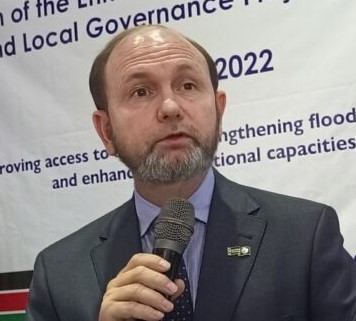You are here: Home | Economy | National News | “Govt institutions’ data unreliable”, World Bank

Firas Raad, the World Bank Country Manager for South Sudan speaking during the launch of Enhancing community resilience and local governance Project phase II in Juba on 8th June 2022. Credit: Charles Wote/Eye Radio
The World Bank has observed that the government’s capacity to generate data is weak and unreliable for credible monitoring of the country’s economy.
The statement is part of the Economic Memorandum for Recovery and Resilience in South Sudan it published last week.
According to the world financial institution, years of instability have affected the ability of the country to develop reliable systems.
It cited that the Central statistical organization’s (CSO’s) capacity to produce statistics has been severely eroded due to conflicts–driven damage to infrastructure and office equipment; disruption of staff salary payments; and cessation of donor projects and training opportunities.
Another reason is, the deteriorating security conditions and geographical divisions that have also crippled the CSO’s ability to collect statistical information to cover all activities in all parts of the country.
As a result, the World Bank said since 2015, only limited official statistics including national accounts, price indices, and poverty data-have been compiled – something it says is hampering effective monitoring and Analysis of the country’s socioeconomic conditions.
Meanwhile, the World Banks observe that the National Bureau of statistics (NBS) Produces monthly consumer price index (CPI) data that are delivered with significant delays and are of poor quality.
And when Gross Domestic Product data are also produced, “neither the government nor the partners use them because of underlying weaknesses in the quality of the data.”
The Bank of South Sudan said it maintains a monthly database of key indicators, but important data, including the balance of payments, are not fully developed.
Besides, fiscal data are affected by lack of transparency on revenue, expenditures, arrears and debt.
The World Bank added that the most recent nationally representative household survey was conducted before the county’s independence, in 2009.
In the post-independence, the word Bank, through the UK department of international Development funding, conducted four rounds of high frequency surveys between 2015 and 2017.
The 2016 data have been extensively used, along with other secondary data sources (spatial and otherwise) to impute poverty at the sub-national level in South Sudan.
However, the world financial institution said these poverty numbers can only be provided for a ranking of countries in terms of welfare levels.
But they cannot estimate the exact number of poor people, or the poverty headcount in each county in South Sudan.
Apparently, “various socioeconomic information related to food prices, WASH, humanitarian needs are being collected by various agencies to monitor humanitarian conditions”, which is usually “neither harmonized nor geographically representative.”
Support Eye Radio, the first independent radio broadcaster of news, information & entertainment in South Sudan.
Make a monthly or a one off contribution.
Copyright 2024. All rights reserved. Eye Radio is a product of Eye Media Limited.